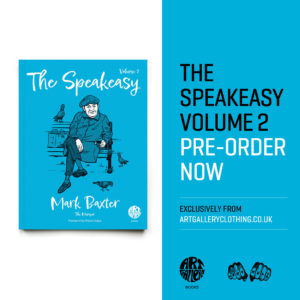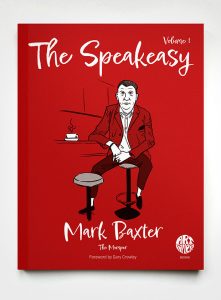
The two things I’ve known about the author Len Deighton for most of my adult life, are 1. He wrote spy novels and 2. Best-selling cookbooks. That diversity has always made me smile and intrigued how the two co-existed.
With the broadcast of the TV adaption of Len’s book ‘The Ipcress File’ beginning its run, on ITV as I write this (early March 2022) I feel it was about time I dug a little deeper on the man. No time like the present.
Leonard Cyril Deighton was born in February 1929 in Marylebone. His mum, a part time cook, arrived to have the baby at a local hospital, but found it closed, so she crossed over the road and had Len in the workhouse opposite. His father worked as a chauffeur to the family of a department head at the British Museum. The Deighton’s lived in Gloucester Place Mews, off Baker Street. At the age of 11 in 1940 , Len saw the arrest of Anna Wolkoff, a white Russian and then a naturalised British citizen, working for the Auxiliary Fire Service. Len’s mum was her cook. Wolkoff was picked up and charged with violating the Official Secrets Act and being a Nazi sympathiser and was eventually imprisoned for ten years. Her arrest, remained lodged in Len’s mind and would prove useful when later writing his first piece of spy fiction.
A Grammar school boy, though he detested going, Deighton first worked on the railways, before serving his national service in the RAF where he trained as a scene of crime photographer for the Special Investigation Branch.
With his demob grant, he first studied at St Martin School of art, before moving on the Royal College of Art, graduating from there in 1955.
From 1956, he worked as a steward for BOAC before becoming a full time advertising illustrator, completing other work for magazines and publishing companies. Among his book jacket work, was the 1957 first edition of ‘On the Road’ by Jack Kerouac.
It would be 1960, before he began to write a spy novel, with an unnamed lead character, who was cynical, streetwise and working class. More of him in a moment…
In the meantime, Len’s next venture was ‘Cookstrip’ for The Observer newspaper. This consisted of a cooking recipe illustrated in cartoon form, which Len had dreamed up whilst working as a restaurant porter at the Royal Festival Hall, during his art school holidays. Whilst there, he’d occasionally assist in the kitchens. That series would run from early 1962 to the summer of 1966. He explained his love of cooking was inspired by his mum.
‘I started cooking very young. My mother let me fool around in the kitchen. She had been one of 16 children, so had had to learn to cook at a young age herself. I was buying expensive cookbooks and I’m very messy and didn’t want to take them into the kitchen (of his flat in Camberwell) so, I wrote out the recipes on paper, and it was easier for me to draw three eggs than write ‘three eggs’. So, I drew three eggs, then put in an arrow. For me it was a natural way to work.’
The strips went on to be very successful.
Next, his spy novel, ‘The Ipcress File’. Deighton said he wrote it for his own ‘fun and enjoyment’ but then met a literary agent at a party, to whom Len mentioned his book. The agent to his credit, took on the book and eventually, after a couple of rejection, found it a publishing deal. The unnamed lead character, working class as mentioned, was placed in among the Oxbridge classes. Upon release, it became a big success. Of course, it being published around the same time as the first James Bond film, ‘Dr. No,’ proved to be excellent timing.
Deighton – ‘The IPCRESS File is about spies on the surface, but it’s also really about a grammar schoolboy among public school boys and the difficulties he faces.’
In the film version from 1965, the lead character was named Harry Palmer by producer Harry Saltzman, and the then relatively unknown Michael Caine, had snagged the starring role. In fact, fellow actor Christopher Plummer was due to take the part, but rejected it in favour of ‘The Sound of Music’. It just so happened Caine had loved the book when it was first published, as he told his then flat mate, Terence Stamp.
‘I’d say, listen to this, Terry, I could do this. Stamp responded, ‘they would never make a film of it and, second, even if they did, you would never get the part.’
In the film, Caine is seen as a wizard in the kitchen, seemingly a radical move at the time in the film business, going by the movie execs. verdict upon seeing the ‘dailies’ of Caine cracking eggs and cooking on screen.
‘Dump Caine’s spectacles and make the girl cook the meal. He is coming across as a homosexual’
In actual fact, the hands doing the cooking, were those of Len Deighton.
This from the book – ‘The first time I saw him was in Frankfurt. He was sitting in a new Jensen sports car which was covered in mud, with a sensational blond. He was wearing very old clothes, smoking a Gauloises and listening to a Beethoven Quartet on the car radio. And I thought: ʻOh God, how many ways can you be a snob simultaneously
Len was 33 when that first book was published, and then began a ridiculously busy few years, with two more novels featuring Harry P, ‘Horse Under Water’ in 1964 and ‘Funeral in Berlin in ’65. Also, that year, Len then goes back in the kitchen for ‘Len Deighton’s Action Cook Book’ and ‘Ou est le garlic’ which contained French recipes, which the food critic, Fay Maschler, described it as ‘one of the best primers to French cookery.’
Two further novels follow in 1966 with ‘Billion Dollar Brain’ and 1967 with ‘An Expensive Place to Die,’ as well as ‘London Dossier’ a guide to the great metropolis, which revealed hundreds of insider tips from ‘the menu at Ronnie Scott’s jazz club, to the history of Chinatown’ . Amongst all that activity, Len also somehow found time to be the travel correspondent for Playboy magazine for a year.
Both ‘Funeral in Berlin’ and ‘Billion Dollar Brain’ were later adapted for film too.
As the 60s wore on, Len dabbled in film production. He worked on ‘Only When I Larf’ based on his own novel, in 1968, and then ‘Oh! What a Lovely War’ in 1969. However, he found the whole experience so dispiriting, he removed his name from the end credits
“I realised after having that multimillion-dollar Hollywood singing-and-dancing film on my hands that solitary life behind a typewriter wasn’t quite as bad as I had been thinking.’
His fascination with the Second World War, sparked off his next series of books and 1970, saw ‘Bomber’ released.
‘I believe I wrote the first novel ever on a computer – Bomber, in 1970. It was enormous, an IBM MT72, and it had no screen.’
The book looked at a Bomber Command raid, from all sides, pilot, ground crew and German civilians. Fellow writer Anthony Burgess regarded it as ‘one of the 99 best novels in English since 1939’ and please note Pop Pickers, that Lemmy of Motorhead fame was a big fan of the book.
‘ got the idea for Bomber (album) from a novel I read, called Bomber by Len Deighton. It’s about a bombing raid over Germany during World War II. And we got to play it on Top of The Pops’
‘Battle of Britain’ was next in 1977, which detailed the day-to-day factual account of that real life air battle. 1978 saw ‘SS-GB’ published from an idea from a friend Ray Hawkey, which looked at how things would have been if Germany had in fact won the War.
He continued his impressive output with ‘Berlin Game’ (1983), ‘Mexico Set’ (1984) ‘London Match’ (1985); ‘Spy Hook ‘(1988), ‘Spy Line’ (1989) ‘Spy Sinker’ (1990) ‘Faith’ (1994), ‘Hope’ (1995) and Charity in 1996.
There were others too. Austrian-born chef de cuisine, Anton Edelmann – ‘I think Len’s best book is ‘Winter’ (1987) It’s a remarkable achievement. He tells the story from the German side. I asked Len: Do you speak German? He said no. It’s remarkable.’
He then took a well-deserved extended break from writing after creating 30 thrillers, let alone the cookbooks and factual works.
‘The best thing about writing books is being at a party and telling some pretty girl you write books, the worst thing is sitting at a typewriter and actually writing the book.’
Deighton lived in many countries over the years, with travel a constant theme in his life. Learning to cook the local cuisine, from the local people, wherever he was in the world important to him. He had been married twice, to Shirley in 1960 and later to Ysabele and they had two sons.
For years, Deighton has shunned publicity and the literary circuit circus he was expected to partake in. Those that know, say there is a shyness within him, but that he himself, just sees what he does as a job, and that is enough, no need really to then talk about it.
Sir Max Hastings – ‘To those of us who were in our twenties in the 1960s, his books seemed the coolest, funkiest, most sophisticated things we’d ever read.’
Last word to Deighton – ‘It’s difficult to believe now – but before the film came out, Michael was still a struggling actor and I was a famous writer. Of course, he overtook me like a skyrocket, but there was a brief period of time when I was more famous than Michael Caine’
The Mumper of SE5
THE SPEAKEASY VOLUME 2 (PRE ORDER – TBC)
*Update – Volume 2 has gone to print & will be delivered soon
There has been a delay due to paper stock however we will receive the books by mid April.
THE SPEAKEASY Volume Two by Mark Baxter (The Mumper)
Illustrations by Lewis Wharton
Foreword by Rhoda Dakar
Available to PRE ORDER here
THE SPEAKEASY VOLUME 1
THE SPEAKEASY Volume One by Mark Baxter (The Mumper)
Illustrations by Lewis Wharton
Foreword by Gary Crowley
Available to ORDER here
ART GALLERY CLOTHING
Further items have just been added to our winter SALE
JOIN US
Sign up to our newsletter and receive an exclusive promo code, latest news & Art Gallery Clothing offers.





